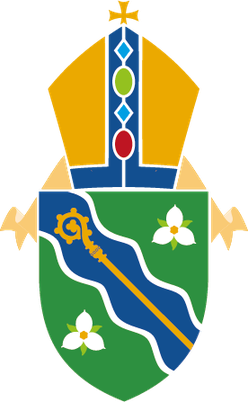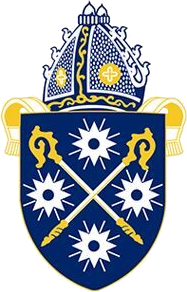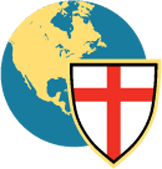Related Research Articles
Since the 1990s, the Anglican Communion has struggled with controversy regarding homosexuality in the church. In 1998, the 13th Lambeth Conference of Anglican bishops passed a resolution "rejecting homosexual practice as incompatible with Scripture". However, this is not legally binding. "Like all Lambeth Conference resolutions, it is not legally binding on all provinces of the Communion, including the Church of England, though it commends an essential and persuasive view of the attitude of the Communion." "Anglican national churches in Brazil, South Africa, South India, New Zealand and Canada have taken steps toward approving and celebrating same-sex relationships amid strong resistance among other national churches within the 80 million-member global body. The Episcopal Church in the U.S. has allowed same-sex marriage since 2015, and the Scottish Episcopal Church has allowed same-sex marriage since 2017." In 2017, clergy within the Church of England indicated their inclination towards supporting same-sex marriage by dismissing a bishops' report that explicitly asserted the exclusivity of church weddings to unions between a man and a woman. At General Synod in 2019, the Church of England announced that same-gender couples may remain recognised as married after one spouse experiences a gender transition. In 2023, the Church of England announced that it would authorise "prayers of thanksgiving, dedication and for God's blessing for same-sex couples."

The Anglican Church of Canada is the province of the Anglican Communion in Canada. The official French-language name is l'Église anglicane du Canada. In 2022, the Anglican Church counted 294,931 members on parish rolls in 1,978 congregations, organized into 1,498 parishes. The 2021 Canadian census counted 1,134,315 self-identified Anglicans, making the Anglican Church the third-largest Canadian church after the Catholic Church and the United Church of Canada.

The blessing or wedding of same-sex marriages and same-sex unions is an issue about which leaders of Christian churches are in ongoing disagreement. Traditionally, Christianity teaches that sexual practices between men and sexual practices between women are sinful and that holy matrimony can only exist between two persons of different sexes. These disagreements are primarily centred on the interpretation of various scripture passages related to homosexuality, sacred tradition, and in some churches on varying understandings of homosexuality in terms of psychology, genetics and other scientific data. While numerous church bodies have widely varying practices and teachings, individual Christians of every major tradition are involved in practical (orthopraxy) discussions about how to respond to the issue.

The Diocese of Niagara is one of thirty regional divisions in the Anglican Church of Canada. The see city of the diocese is Hamilton, with the bishop's cathedra located at Christ's Church Cathedral on James Street North. Located within the ecclesiastical province of Ontario, it borders the Dioceses of Huron and Toronto. The area enclosed by the Diocese of Niagara includes much of the Golden Horseshoe, and moves north to include Erin and Orangeville as far as Shelburne. Moving sharply south, the boundary includes Mount Forest and widens, south-westerly to include Elora and Guelph. Skirting Brantford and the Territory of the Six Nations Confederacy, the line then travels, again, south-westerly to Jarvis and Lake Erie to include the entire Niagara Peninsula. Major urban centres within its borders are St. Catharines, Niagara Falls, Hamilton, Guelph, Oakville, Milton, Burlington, and Orangeville.

The Anglican Diocese of Perth is one of the 23 dioceses of the Anglican Church of Australia. The constitution of the Diocese of Perth was passed and adopted in 1872 at the first synod held in Western Australia. In 1914, the Province of Western Australia was created and the diocesan bishop of Perth became ex officio metropolitan bishop of the new province and therefore also an archbishop.
The Ecclesiastical Province of Ontario is one of four ecclesiastical provinces in the Anglican Church of Canada. It was established in 1912 out of six dioceses of the Ecclesiastical Province of Canada located in the civil province of Ontario, and the Diocese of Moosonee from the Province of Rupert's Land.
The Diocese of Toronto is an administrative division of the Anglican Church of Canada covering the central part of southern Ontario. It was founded in 1839 and is the oldest of the seven dioceses comprising the Ecclesiastical Province of Ontario. It has the most members of any Anglican diocese in Canada. It is also one of the biggest Anglican dioceses in the Americas in terms of numbers of parishioners, clergy and parishes. As of 2018, the diocese has around 230 congregations and ministries in 183 parishes, with approximately 54,000 Anglicans identified on parish rolls.
The Anglican realignment is a movement among some Anglicans to align themselves under new or alternative oversight within or outside the Anglican Communion. This movement is primarily active in parts of the Episcopal Church in the United States and the Anglican Church of Canada. Two of the major events that contributed to the movement were the 2002 decision of the Diocese of New Westminster in Canada to authorise a rite of blessing for same-sex unions, and the nomination of two openly gay priests in 2003 to become bishops. Jeffrey John, an openly gay priest with a long-time partner, was appointed to be the next Bishop of Reading in the Church of England and the General Convention of the Episcopal Church ratified the election of Gene Robinson, an openly gay non-celibate man, as Bishop of New Hampshire. Jeffrey John ultimately declined the appointment due to pressure.

Colin Robert Johnson is the former Anglican archbishop of Toronto and Moosonee, and he served as Metropolitan of the Ecclesiastical Province of Ontario from 2009 to 2018. He was the 11th Bishop of Toronto, the largest diocese in the Anglican Church of Canada.

The Diocese of the Arctic is a diocese of the Ecclesiastical Province of the Northern Lights of the Anglican Church of Canada. It is by far the largest of the thirty dioceses in Canada, comprising almost 4,000,000 km2 (1,500,000 sq mi), or one-third the land mass of the country. As the name indicates, the diocese encompasses the Arctic region of Canada including the entirety of the Northwest Territories, Nunavut, and the Nunavik region of northern Quebec. The see city is Iqaluit, Nunavut, and the diocese's nearly 34,000 Anglicans are served by 48 parishes. The administrative offices of the diocese are located in Yellowknife, Northwest Territories.

The Anglican Church in North America (ACNA) is a Christian denomination in the Anglican tradition in the United States and Canada. It also includes ten congregations in Mexico, two mission churches in Guatemala, and a missionary diocese in Cuba. Headquartered in Ambridge, Pennsylvania, the church reported more than 1,000 congregations and more than 128,000 members in 2023. The first archbishop of the ACNA was Robert Duncan, who was succeeded by Foley Beach in 2014. In June 2024, the College of Bishops elected Steve Wood as the third archbishop of the ACNA. Authority was transferred to him during the closing Eucharist at the ACNA Assembly 2024 conference in Latrobe, Pennsylvania. The Anglican Church in North America is a Confessing Anglican denomination, being a member of the Global Fellowship of Confessing Anglicans (GAFCON).
The Diocese of Moosonee is a diocese of the Ecclesiastical Province of Ontario of the Anglican Church of Canada. It was created in 1872 from part of the Diocese of Rupert's Land, in what is now the Province of the Northern Lights, and transferred in 1912 to the new Province of Ontario. Now headquartered in Timmins, Ontario, it was originally headquartered in Moose Factory. Its first bishop was John Horden.

Sir David John Moxon is a New Zealand Anglican bishop. He was until June 2017, the Archbishop of Canterbury's Representative to the Holy See and Director of the Anglican Centre in Rome. He was previously the Bishop of Waikato in the Diocese of Waikato and Taranaki, the archbishop of the New Zealand dioceses and one of the three primates of the Anglican Church in Aotearoa, New Zealand and Polynesia. In the 2014 New Year Honours, he was appointed a Knight Companion of the New Zealand Order of Merit for services to the Anglican Church and was made Knight of the Order of St John in the 2024 Special Honours.

The ordination of women in the Anglican Communion has been increasingly common in certain provinces since the 1970s. Several provinces, however, and certain dioceses within otherwise ordaining provinces, continue to ordain only men. Disputes over the ordination of women have contributed to the establishment and growth of progressive tendencies, such as the Anglican realignment and Continuing Anglican movements.
The Anglican Church of Canada is the third largest church in Canada, after the Roman Catholic Church and the United Church of Canada. After many years of debate, the first blessing of a same-sex partnership took place in 2003, by the Diocese of New Westminster, in Vancouver. This was not considered a marriage ceremony, but rather a blessing of "permanent and faithful commitments" between persons of the same sex.
The Territory of the People is a "recognized territory [with] the status of a diocese" formed in 2002 out of the former Anglican Diocese of Cariboo, part of the Ecclesiastical Province of British Columbia and the Yukon of the Anglican Church of Canada.
John Charles Bothwell was a Canadian Anglican bishop and author in the second half of the 20th century.

David Ralph Spence is a Canadian retired Anglican bishop.
Peter Wall is a Canadian Anglican priest and the retired Dean of Niagara. From October 2022 to January 2024, he has been Interim Dean of Toronto and Priest-in-Charge of the Cathedral Church of St. James.
Susan Jennifer Anne Bell is a Canadian Anglican bishop. Since 2018, she has served as 12th Bishop of Niagara in the Anglican Church of Canada.
References
- ↑ Anglican Communion
- ↑ Who's Who 2008: London, A & C Black, 2008 ISBN 978-0-7136-8555-8
- ↑ "Diocese of Niagara website". Archived from the original on 2011-07-06. Retrieved 2010-11-19.
- ↑ Spectator, Carmela Fragomeni Staff Reporter, The Hamilton (2017-09-20). "Anglican bishop reflects on his time in city". The Hamilton Spectator. ISSN 1189-9417 . Retrieved 2024-11-13.
{{cite news}}: CS1 maint: multiple names: authors list (link) - ↑ Forget, André (2015-09-16). "Diocese of Niagara cautiously optimistic about future". Anglican Journal. Retrieved 2024-11-13.
- ↑ "A Message to the Clergy and People of the Diocese of Niagara | News in the Diocese".
- ↑ "Electoral Synod | News in the Diocese | Anglican Diocese of Niagara". niagaraanglican.ca. Archived from the original on 2018-01-14.